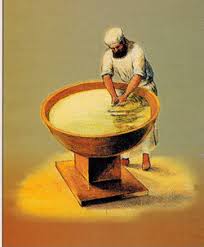The Brazen Laver
The Brazen Laver would sit between the Tabernacle and Brazen Altar. The Levitical Priests would be required to wash their hands and feet prior to entering the Tabernacle or facilitating/tending to the sacrificial offerings on the Brazen Altar (30:17-21). A failure on the part of any Levitical Priest’s part to wash as commanded would result in the negligent priest’s death.

Anointing Oil
Father commanded that the Anointing Oil consist of:
- Myrrh (500 shekels/~12.5 lbs)–a fragrant spice; bitter in taste; nevertheless, sweet in scent. The tree from which this spice was derived could be obtained in two ways: (a) by lacerating the bark of the tree; or (b) from the spontaneous free-flow of the spice from the tree. The “myrrh” in which the Hebrew directly points is the spontaneous, free-flowing version of the myrrh. And it was this spontaneous version of the spice that was considered most excellent and valuable. The myrrh hardens into globules and then ground into a powder. According to “The Bride in Canticles (5:13): “His (speaking about Yeshua Messiah) lips are like lilies, dropping sweet-smelling myrrh.” Regardless the station in life in which any person who came into contact with Messiah, the reaction was always that the words that He spoke were exceptional and gracious. Myrrh was also used as a pain reliever. The Messianic similarity to this of course is that our Master is a very present help in the time of trouble.
- Cinnamon (250 shekels/~6-1/4 lbs)–inner bark–sweet and fragrant. This of course is expressive of the character and person of our Master Yeshua Messiah.
- Calamus (250 shekels/~6-1/4 lbs)–the pith–Calamus would be emblematic of the sweetness of the Ruach of Mashiyach in all aspects of His being.
- Cassia (500 shekels/~8 lbs)–outer bark–emblematic of the sweetness and excellency of the external character and conduct of Mashiyach throughout His earthly ministries.
- Olive Oil (1 hin/~1 gal)–symbolic of the Ruach HaKodesh. Being in measure a hin, the added Holy Spirit is emblematic of the full measure of the Ruach that Abba provided Yeshua Mashiyach. We know that the Olive Oil to be used here had to be beaten and it was deemed holy.
Each of these 4-spices were derived from trees. Collectively and individually these represent the excellencies and perfections of Mashiyach.
The anointing oil was to be sacred. It was to be used to anoint the entire sanctuary, the Levitical Priests, and implements of the Tabernacle (30:22-33).
Types of the Tabernacle and Temple
The principle spices would be composed of the chief or most excellent spices. The combination of spices and olive oil was emblematic of the Spirit of Mashiyach that indwells every true Netzari/Messianic.
The Sacred Perfume
The Perfume (aka Sweet Incense) of the Holy Place would consist of:
- Stacte–in Hebrew the term is derived from that which is “free flowing” or comes in “free flowing droplets” (similar to the myrrh of the anointing oil). Indeed, this element of the sacred perfume aptly foreshadowed the giving nature of our Mashiyach. He gave freely without reservation and without concern or thought for Himself. And He continues to give each day, and throughout everyday, to intercede on our behalf before the Eternal One.
- Onycha–In Hebrew denotes “lion.” The character of our Master is brilliantly embedded in this element of the sacred perfume. For “onycha” signifies our Master’s steadfastness to do His Father’s Will, even to death. Also, we cannot overlook the title often attributed unto our Master: that of being “The Lion of the Tribe of Judah (Rev. 5:5,6).
- Galbanum–the Hebrew root signifies “milk” or “fat.” And of course, we are reminded here of that which would be burnt upon the Brazen Burnt Altar that was pleasing unto Father. The Father demanded that the fat of the sacrificed animal–that which was always considered the best and most tasty part of the animal–be rendered unto Him on the altar of sacrifice. And indeed, Yeshua, our Older Brother, who gave Himself for us on the execution stake–the altar of sacrifice if you will–was the best of all humanity. He was freely offered upon the altar of sacrifice to atone for our sins and bring us into fellowship with the Almighty One; YHVH our Elohim. Halleluyah! Halleluyah! Praise His Holy Name! Shout unto the King of Glory for our redemption draweth ever so nigh!
- Frankincense–the Hebrew word signifying “white.” It shouldn’t take much in the way of thought and reflection that this element of the Sacred Perfume denoted “the purity, piety, and acceptability of Him who was holy, harmless, undefiled and separate from sinners” (T. Newberry; “Types of the Temple and Tabernacle”).
The Perfume would sit before the Ark of the Testimony and treated as holy (30:34-38). It would attest (foreshadow) the sweetness of Yahoshua’s Person and the sweet aroma of His Words. And the fact that it would sit before the throne–the mercy seat–tells us the significance that Father placed in its presence. For Yahoshua HaMashiyach, ever so before the Mercy Seat of the Most High in the Heavenly Tabernacle, beloved of the Most High, is forever interceding on our behalf before Father. Indeed, the presence and actions of our Master in the Heavenly Tabernacle is most pleasing to the Father.
